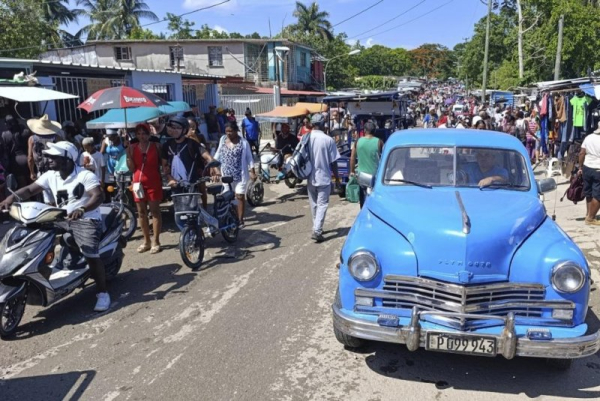

People walk along a commercial street in Havana in late July. A record number of protests and complaints were reported in Cuba in August, according to a monthly report from the Cuban Observatory of Conflicts. File Photo by Ernesto Mastrascusa/EPA
A record number of protests and complaints were reported in Cuba in August, according to a monthly report from the Cuban Observatory of Conflicts. It said Cubans voiced growing frustration over constant blackouts and worsening shortages of running water and other public services through more than 1,000 protest actions that month.
The observatory is an independent organization that monitors and documents social unrest, civic protests and repression in Cuba. It functions as a watchdog for civil liberties, tracking how citizens respond to deteriorating living conditions, government policies and systemic failures.
The report also said Cubans continued to challenge the island’s police state with street demonstrations, graffiti on walls and activity on social media. In addition, public safety complaints rose, with deaths, disappearances, violence and crime doubling at what was described as an alarming level.
Residents on the island face daily power cuts that last for extended periods and a worsening shortage of drinking water, which the report said has completely disrupted daily life. Both problems fueled street protests that achieved some results, but also led to arrests, according to the report.
President Miguel Díaz-Canel’s government “continues to claim it has no money to buy the fuel needed to stabilize electricity on the island, or to purchase medicines, with only 35% of essential medicines available,” Rolando Cartaya, project director at the Foundation for Human Rights in Cuba and author of the report, told Infobae.
However, last month the Miami Herald published an investigative report that cited documents from GAESA, a powerful conglomerate tied to Cuba’s Revolutionary Armed Forces, that said the military holds about $18 billion in offshore accounts.
Cartaya said stabilizing electricity would cost about $250 million a year, while restocking medical supplies would require about $75 million.
After leading the Observatory of Conflicts’ monthly tally for two months, the category “Challenges to the police state” dropped to second place in August.
The report said acts of defiance — bold enough to trigger repressive responses — included street protests, such as pot-banging demonstrations, roadblocks and sit-ins outside local government offices, along with clandestine civic actions like antigovernment graffiti and sabotage of state property, including the telecommunications company.
At the same time, activists, intellectuals and citizens used social media to counter the government’s effort to invoke the memory of Fidel Castro on the 99th anniversary of his birth, Aug. 13.
In the category of “Public insecurity,” the observatory recorded twice as many protests or complaints, with a rise in deaths linked to social, criminal or gender-based violence. The group also reported missing persons and at least five incidents involving firearms.
Regarding public health, protests rose sharply in August after Cuba told the United Nations it had sent 605,000 health workers to 165 countries, even as the island faces a shortage of doctors. The report said the Cuban government sends medical professionals abroad as a way to earn hard currency.
At the same time, the month brought its share of complaints about citizens left vulnerable during the summer’s complex epidemiological situation.
The report cited deteriorating infrastructure, resources and services in about 20 hospitals; shortages of medicines and treatments that led to appeals for help on social media; and cases of medical negligence, often fatal.
As state-subsidized rations continue to shrink and deliveries face longer delays, food insecurity Cubans face, according to the the observatory.
The report added that although the government touted as a success a rise in the average monthly salary to 6,649 Cuban pesos ($16), estimates show that because of inflation and government-imposed dollarization, Cubans need about 30,000 pesos ($73) per person each month just to eat.